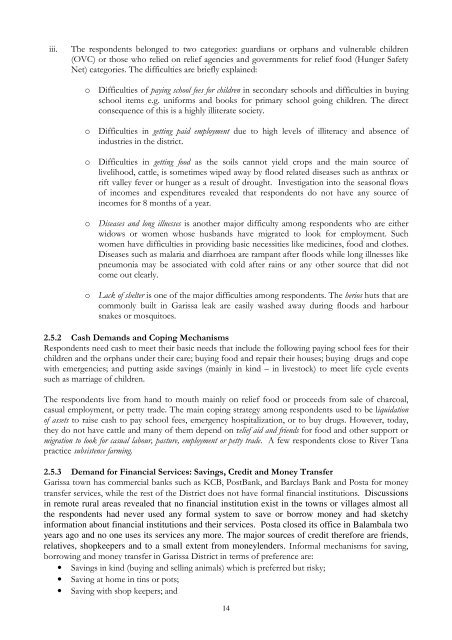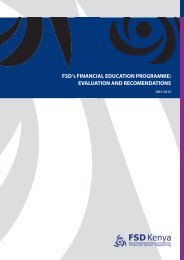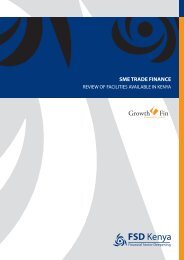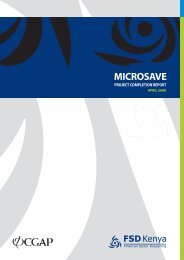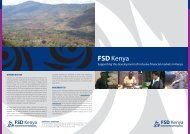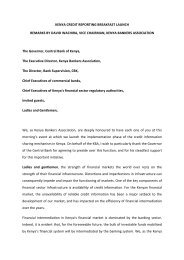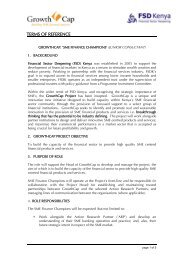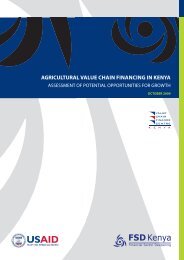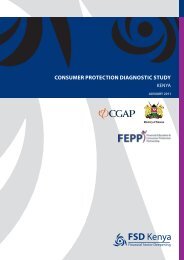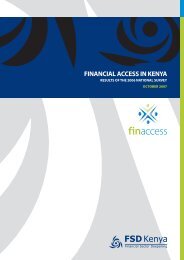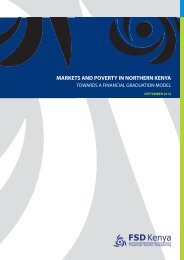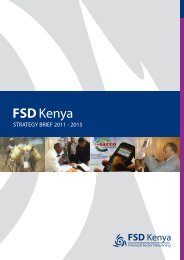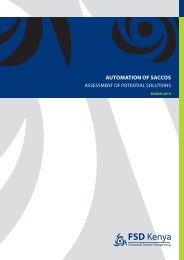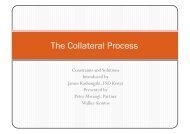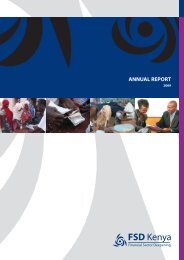FINAL REPORT - FSD Kenya
FINAL REPORT - FSD Kenya
FINAL REPORT - FSD Kenya
Create successful ePaper yourself
Turn your PDF publications into a flip-book with our unique Google optimized e-Paper software.
iii. The respondents belonged to two categories: guardians or orphans and vulnerable children<br />
(OVC) or those who relied on relief agencies and governments for relief food (Hunger Safety<br />
Net) categories. The difficulties are briefly explained:<br />
o Difficulties of paying school fees for children in secondary schools and difficulties in buying<br />
school items e.g. uniforms and books for primary school going children. The direct<br />
consequence of this is a highly illiterate society.<br />
o Difficulties in getting paid employment due to high levels of illiteracy and absence of<br />
industries in the district.<br />
o Difficulties in getting food as the soils cannot yield crops and the main source of<br />
livelihood, cattle, is sometimes wiped away by flood related diseases such as anthrax or<br />
rift valley fever or hunger as a result of drought. Investigation into the seasonal flows<br />
of incomes and expenditures revealed that respondents do not have any source of<br />
incomes for 8 months of a year.<br />
o Diseases and long illnesses is another major difficulty among respondents who are either<br />
widows or women whose husbands have migrated to look for employment. Such<br />
women have difficulties in providing basic necessities like medicines, food and clothes.<br />
Diseases such as malaria and diarrhoea are rampant after floods while long illnesses like<br />
pneumonia may be associated with cold after rains or any other source that did not<br />
come out clearly.<br />
o Lack of shelter is one of the major difficulties among respondents. The herios huts that are<br />
commonly built in Garissa leak are easily washed away during floods and harbour<br />
snakes or mosquitoes.<br />
2.5.2 Cash Demands and Coping Mechanisms<br />
Respondents need cash to meet their basic needs that include the following paying school fees for their<br />
children and the orphans under their care; buying food and repair their houses; buying drugs and cope<br />
with emergencies; and putting aside savings (mainly in kind – in livestock) to meet life cycle events<br />
such as marriage of children.<br />
The respondents live from hand to mouth mainly on relief food or proceeds from sale of charcoal,<br />
casual employment, or petty trade. The main coping strategy among respondents used to be liquidation<br />
of assets to raise cash to pay school fees, emergency hospitalization, or to buy drugs. However, today,<br />
they do not have cattle and many of them depend on relief aid and friends for food and other support or<br />
migration to look for casual labour, pasture, employment or petty trade. A few respondents close to River Tana<br />
practice subsistence farming.<br />
2.5.3 Demand for Financial Services: Savings, Credit and Money Transfer<br />
Garissa town has commercial banks such as KCB, PostBank, and Barclays Bank and Posta for money<br />
transfer services, while the rest of the District does not have formal financial institutions. Discussions<br />
in remote rural areas revealed that no financial institution exist in the towns or villages almost all<br />
the respondents had never used any formal system to save or borrow money and had sketchy<br />
information about financial institutions and their services. Posta closed its office in Balambala two<br />
years ago and no one uses its services any more. The major sources of credit therefore are friends,<br />
relatives, shopkeepers and to a small extent from moneylenders. Informal mechanisms for saving,<br />
borrowing and money transfer in Garissa District in terms of preference are:<br />
• Savings in kind (buying and selling animals) which is preferred but risky;<br />
• Saving at home in tins or pots;<br />
• Saving with shop keepers; and<br />
14


